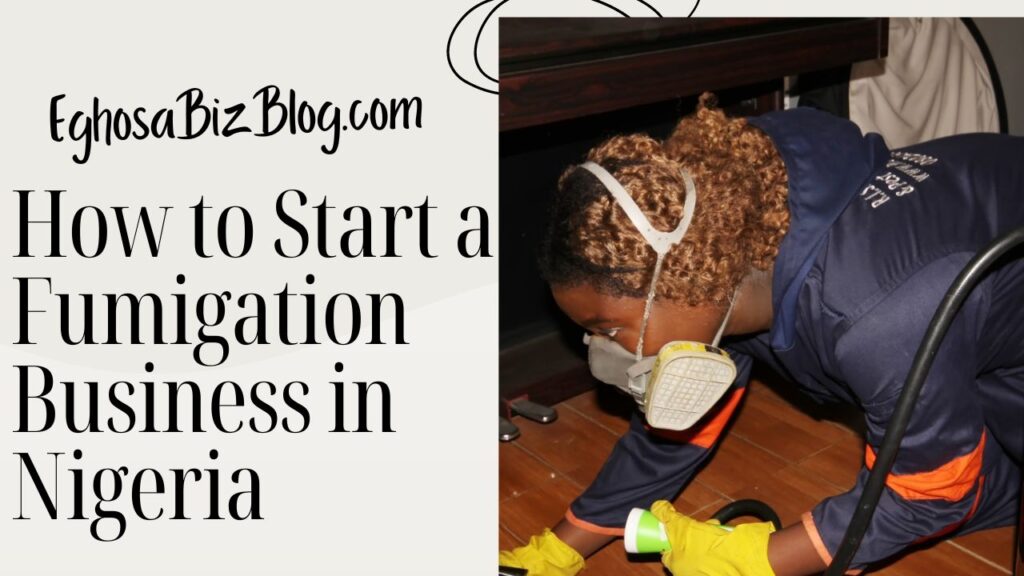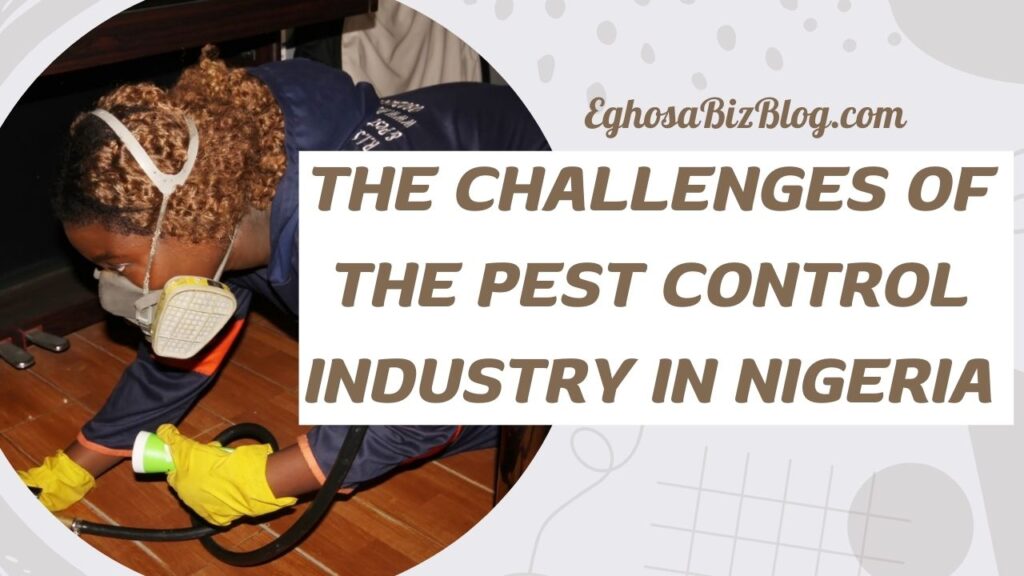
A fumigation business involves providing pest control services by using chemical fumigants to eliminate pests such as insects, rodents, termites, and other harmful organisms. Fumigation is often used in homes, offices, warehouses, agricultural settings, and food storage facilities to protect against pest infestations that could damage property or harm human health.
In this business, specialized equipment and chemicals are used to create a gas or vapor that fills an entire space, targeting pests hidden in cracks, crevices, or hard-to-reach areas. The process must be conducted carefully by professionals to ensure safety, as the chemicals can be hazardous to humans and animals if not handled properly.
Starting a fumigation business in Nigeria is an excellent opportunity and highly profitable due to the strong demand for pest control services in both residential and commercial areas. This business offers flexibility, as you can focus on various types of pests, such as insects, rodents, and more, without needing to handle everything from the start.
Here’s a step-by-step guide to help you launch your fumigation business successfully.
Table of Contents
1. Is This Business Right for You?:
Before stepping into the fumigation business, it’s crucial to assess if this is the right path for you. This is not just a side job or casual venture—it’s a full-fledged business that will consume much of your time, energy, and focus. You’ll need to immerse yourself completely, ensuring you’re prepared to handle the demands that come with it. Ask yourself if you’re truly ready for that level of commitment.
Your involvement will require you to deal with a variety of pests, from insects to rodents and possibly other critters. Take a moment to consider your comfort level with these aspects. Pest control is a broad field, and while you don’t have to dive into every service at once, you’ll need to decide where to start. You can begin with basic services and expand into more specialized areas as you gain experience and confidence.
Before anything else, research is key. Learning about the industry thoroughly will not only help you understand its challenges but also equip you to manage your time and resources effectively. Doing this groundwork can save you from costly mistakes and wasted effort in the long run.
2. Understanding the Competition:
To build a successful fumigation business in Nigeria, you must study your competition. In any city or town, you will have competitors ranging from small independent operators to larger companies. This step is crucial for understanding the gaps in the market and the opportunities for your business.
Look for what your competitors do well and where they fall short. Focus not only on their weaknesses but also on their strengths—because those are areas you can learn from. For instance, some companies might excel at offering organic or eco-friendly pest control solutions. If this resonates with your vision, it could be a unique selling point that helps you stand out.
Also, take note of the products and services they offer, their pricing strategies, and the quality of their work. Some companies may offer cheaper prices due to economies of scale, but that doesn’t mean you have to undercut everyone. Instead, focus on offering value by solving your customer’s pain points in a way that sets you apart.
3. Legal Requirements and Licensing:
To ensure your fumigation business operates legally in Nigeria, you must navigate several key legal requirements. The first critical step is to register your business. It’s highly advisable to set up your fumigation venture as a Limited Liability Company (LLC) rather than a sole proprietorship.
Doing so provides a stronger legal shield by separating your personal assets from any liabilities that might arise in the course of business operations. This is especially vital in a fumigation business, where handling chemicals presents inherent risks, and potential legal claims could threaten your personal finances if your business is not properly structured.
You will also need to secure the appropriate licenses and permits. Because fumigation involves working with chemicals that can be hazardous, regulatory oversight is required.
Here are the common licenses and Permit you need for your fumigation business:
- 1. Corporate Affairs Commission (CAC) Registration
- 2. Fumigation Permit from the Environmental Health Officers Registration Council of Nigeria (EHORECON)
- 3. License from the Federal Ministry of Environment
- 4. Pesticide Application License: This can be obtained from the National Agency for Food and Drug Administration and Control (NAFDAC)
- 5. State and Local Government Approvals: Visit the relevant local environmental or health department to obtain the necessary permits and licenses specific to your area.
- 6. Health and Safety Certification : Such certifications are often mandatory and can be obtained through accredited health and safety training centers.
In addition, acquiring liability insurance is a non-negotiable requirement. This insurance will protect your business against accidents, damages, or any legal claims that might arise from your services. With the nature of the fumigation industry involving chemicals and potential risks to health and property, having proper insurance ensures that your business is safeguarded from unforeseen incidents.
4. Funding and Equipment:
It’s essential to understand that you don’t need a massive upfront investment to get started. However, careful budgeting for specific essentials is crucial to laying a solid foundation for your new venture.
Your initial costs will include equipment, training, certifications, and a reliable vehicle. If you already own a personal vehicle, consider using it in the beginning; this approach will help you save money until your business begins to grow and you can afford to invest in a dedicated service vehicle.
One critical aspect to keep in mind is the importance of avoiding debt from the outset. Starting small allows you to focus on building your business without the burden of financial pressure. As you begin to generate profits, reinvest them back into the business to facilitate growth and expand your services. This strategy will enable you to enhance your operations gradually without compromising your financial stability.
When it comes to equipment, prioritize investing in the necessary tools for fumigation. This includes sprayers, protective gear, and the specific chemicals you’ll use. However, it’s vital to remember that you don’t need to purchase everything at once. Begin with the essentials and expand your inventory as your
5. Invoicing and Financial Management:
To run a successful business, it’s important to manage your finances effectively from the start. You need a reliable invoicing and bookkeeping system in place. Thankfully, there are affordable options available like QuickBooks and FreshBooks, which allow you to send invoices and track payments.
Proper financial management also includes understanding your profit and loss (P&L) statement. This document tracks your income and expenses, showing you where the money is going. Knowing your business numbers will help you price your services correctly and ensure that you are running a profitable business rather than just creating a job for yourself.
6. Marketing and Branding:
How will people in Nigeria know that your fumigation business exists? You’ll need to develop a marketing plan that makes use of both free and paid advertising methods.
- Word of Mouth: This remains one of the most effective marketing tools. Build relationships with your customers and encourage them to recommend you to others.
- Online Presence: Claim your business on Google, Bing, and other platforms. Many customers search online when looking for fumigation services, so having a well-maintained online presence is key.
- Social Media: Use Facebook, Instagram, and other platforms to engage with your local community. However, don’t spam potential customers. Engage meaningfully and showcase your work periodically.
- Real Estate Agents: Many realtors need fumigation services regularly. Build relationships with them, as they can become a valuable source of referrals.
Start with cost-effective methods of advertising, such as flyers, postcards, or even attending community events. As you grow and generate more revenue, you can expand into paid advertisements like Facebook ads or Google Ads.
The Challenges of the Pest Control Industry in Nigeria

Entering the pest control industry in Nigeria offers significant potential, but as you consider starting this business, it’s important to be aware of the challenges you may face. Understanding these obstacles can help you prepare adequately and ensure your business thrives.
1. Wide Range of Services: The pest control industry in Nigeria covers a broad spectrum of services, from handling insects and rodents to termites and other critters. This range of pests requires specialized knowledge and tools for effective treatment. You may feel overwhelmed initially with the choice of which services to offer. To tackle this challenge, it’s best to start small and specialize in a few areas before expanding. You can learn and gain experience as you grow, enabling you to eventually offer more comprehensive services.
2. Intense Competition: The competition in the pest control business is fierce. You will be up against established players, including both small independent operators and larger companies with multiple service vehicles and significant resources. It’s essential that you thoroughly research your competitors. Instead of focusing solely on their weaknesses, you should also observe what they do well and look for ways to distinguish yourself from them. Your ability to identify and solve customer pain points in unique ways will help you stand out in the market.
3. Quality Control and Pricing Challenges: Another challenge is maintaining high service quality while navigating the pricing structure of the industry. Larger companies may offer lower prices due to their ability to work in volume, but they also have higher operational costs. As a smaller business, you may be tempted to lower your prices to attract customers, but this can hurt your profitability. Instead, focus on providing excellent service and ensuring your prices reflect the value you bring. Research your competitors’ prices, but remember that you are not in a race to be the cheapest.
4. Regulatory and Legal Hurdles: The pest control industry in Nigeria is heavily regulated due to the handling of hazardous chemicals. This poses a significant challenge for new entrants. You will need to comply with various legal requirements, including registering your business, obtaining necessary licenses, and ensuring that you and your employees are certified to use pest control chemicals safely. Additionally, understanding the specific regulations in your state or local area is critical. Failing to comply with these regulations could result in fines or even the shutdown of your business.
5. Financial Constraints: Starting a pest control business may not require a large upfront investment, but you will still need to budget for equipment, certification, and insurance. Some new business owners struggle with the financial aspects of starting out, especially if they lack the initial capital. It’s wise to avoid going into debt by starting small and reinvesting your profits as you grow. By carefully managing your finances and gradually expanding, you can mitigate this challenge.
6. Marketing and Building a Customer Base: One of the most difficult aspects of the pest control business is making sure potential customers know you exist. You’ll need to be creative with your marketing, especially when you’re just starting out and have a limited budget. Word of mouth and free online tools like Google Business and social media platforms are crucial for getting the word out. However, building a loyal customer base takes time and consistent effort. Ensuring you maintain high service standards will help generate referrals, which can become a major source of new business over time.
7. Training and Certification: In the pest control industry, ongoing education and certification are vital. You must be trained to handle chemicals safely, and this requires regular updates as regulations and products change. While this is an important part of running a pest control business, many new business owners find it challenging to balance staying compliant with the daily demands of their operations.
8. Client Management and Payment Systems: Efficiently managing your clients and ensuring timely payments can be a major hurdle, especially for new businesses. You need to implement a reliable system for invoicing, tracking services, and receiving payments. As you begin to scale, this can become more complex. Many new business owners fail to establish proper systems for invoicing and bookkeeping, leading to cash flow issues. It’s crucial to set up an organized and professional system from the start to avoid these challenges.
9. Staffing and Hiring: As your business grows, you may need to hire additional staff. Finding qualified and reliable employees is often a challenge in the pest control industry. You must also train them properly to ensure they meet the necessary safety standards and provide the level of service your customers expect. Many business owners struggle with high turnover rates or difficulties in managing staff, so preparing for this challenge early on is essential.



